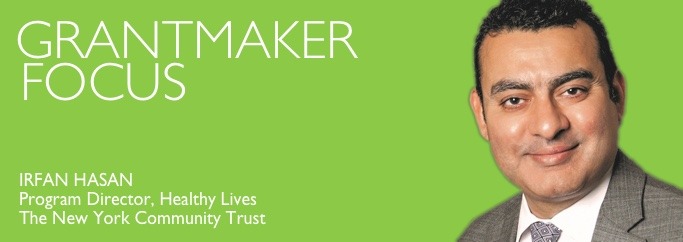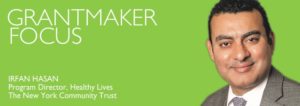
Address: 900 Third Avenue, 22nd Floor, New York, NY 10022
Phone: 212.686.0010
Email: iha@nyct-cfi.org
Web: www.nycommunitytrust.org
The New York Community Trust was formed by 11 banks in 1924 to more effectively make grants from the charitable trusts they held. One of the oldest and largest community foundations in the country, The Trust has had many “firsts”: in 1931 it developed the nation’s first donor-advised fund; in the 1970s it created two divisions—the Long Island and Westchester Community Foundations—to help suburban donors address needs in their communities; in the early 1980s it was a pioneer among foundations supporting AIDS research; and just hours after the attack on the World Trade Center and Pentagon, The Trust created the September 11thFund, raising more than half a billion dollars to help victims, families, and communities affected by the attacks. Today, The Trust has built a permanent endowment to support nonprofit organizations that make New York City and its suburbs a vital and secure place to live and work. It is one of the largest funders of nonprofits in the metropolitan New York area, with a roster of more than 20,000 grantees.
As a community foundation and a public charity, The Trust—along with its two divisions, the Long Island and Westchester Community Foundations—is dedicated to improving the lives of residents of New York City, Westchester, Suffolk, and Nassau counties. It helps individuals, families, foundations, and businesses to support nonprofits that make a difference.
The Trust’s competitive grants are made possible by funds set up by donor bequests and wills to support projects to make life better for all New Yorkers. It hosts funder collaboratives so other foundations can pool funds to jointly work on areas of common interest, and its donor-advisors establish funds during their lifetime to make grants to nonprofits in New York and beyond that complement its competitive grants.
Program Information:
The Trust’s grants support projects to improve the lives of New Yorkers across three broad areas: Healthy Lives, Promising Futures, and Thriving Communities.
- Healthy Lives—The Trust helps providers deliver efficient, patient-focused, equitable, and cost-effective health and behavioral health services. It supports projects that develop the skills and independence of four groups of people with special needs: the elderly, the blind or visually impaired, children and youth with disabilities, and people with developmental disabilities. It funds biomedical research and animal welfare projects.
- Promising Futures—The Trust’s grants help young people prosper; provide job training and placement; make educational and justice systems work for everyone; alleviate hunger and homelessness; improve family and child welfare services; and advance the practice of social work.
- Thriving Communities—The Trust makes grants to groups that protect and create affordable housing, promote equity in the arts, improve civic engagement, and protect our environment. It supports agencies addressing these issues at the neighborhood level, as well as nonprofit institutions and government working systemically. It also supports efforts to improve the functioning of nonprofits and government.
Financial Information:
Total Assets: $2.6 billion FY18
Amount Dedicated to Health-Related Grants: $19.5 million
- Special Initiatives and/or Representative Health and Human Services Grants:
Partnerships for Early Childhood Development (PECD)—PECD is helping eight New York City hospital-based pediatric primary care practices work systemically with community agencies to identify risks to healthy child development and connect families to enhanced service to mitigate risks to children’s physical, social-emotional, and cognitive development. PECD is a multifunder project: The Altman Foundation, United Hospital Fund, and William J. and Dorothy K. O’Neill Foundation (all GIH members) support this project. The United Hospital Fund also coordinates a grantee learning collaborative and oversees an independent evaluator. ($340,000)
Strengthening Programs Serving People with Opioid Addiction—In New York City there are nearly four unintentional drug overdose deaths a day: the equivalent of one every six hours. More New Yorkers die of opioid-related overdoses than from car crashes and homicides combined. Three agencies are using innovative approaches to combat the issue in neighborhoods with a concentration of overdose deaths. Community Health Action of Staten Island is expanding the borough’s only 24-hour drop-in drug treatment recovery center. Services for the Underserved is training peers at its new Brooklyn behavioral health clinic. Vocational Instruction Project Community Services will add weekend services to its Bronx addiction treatment program. ($375,000)
Helping community health centers add social determinants of health to newly created value-based payment systems—New York State’s health care system is being transformed from rewarding volume through fee-for-service payments to a value-based system that will reward individual and population health improvement. Community health centers are key safety net providers and critical institutions to carry out these reforms as they offer a range of primary and specialty care and also serve patients with a disproportionate number of adverse social determinants of health. The Community Health Care Association of New York State is using The Trust grant to tailor a tool created by the National Association of Community Health Centers so New York health centers can understand and act on patients’ social determinants of health. ($600,000)
South Bronx Healthy and Livable Neighborhoods Program—Three neighborhoods in the South Bronx, New York—Mott Haven, Morrisania, and Hunts Point—are part of the poorest congressional district in the nation and in a county with the state’s worst health status. This project is built on the theory that improving two key factors that affect community health—food and usable outdoor space—could improve health outcomes, even in poor neighborhoods. BronxWorks, Claremont Neighborhood Houses, and Urban Health Plan are leading the charge. Initial reports show some success: for the first time ever there is an increased proportion of healthy weight among children and adolescents and more residents are participating in diabetes prevention programs and activities. The New York State Health Foundation (NYSHealth), also a GIH Funding Partner, began a similar project in three other city locations and three upstate sites. The Trust and NYSHealth, with Altman Foundation support, are working together on a nine-site shared technical assistance program (Healthy Places by Design) and evaluation (New York University)., ($1.5 million)
Preventing and Responding to Lead Poisoning—While most of The Trust’s grantmaking is local, its environmental health grants are supported by a bequest that mandates a local, national, and international approach. Preventing and responding to lead exposure remains a priority given historically widespread use in a variety of products from plumbing to house paint to cosmetics. A slate of grants address this challenge on a local and national level: the Children’s Defense Fund–New York is leading a campaign to reduce children’s exposure to lead in New York State; Earthjustice’s national litigation and advocacy seeks to eliminate lead exposure in the United States; and the Lead Legal Strategies Partnership provides technical assistance to 13 communities in New York and across the nation to improve laws to prevent lead exposure. ($305,000)
Strategic Changes in Grantmaking Direction
“For nearly 100 years, The New York Community Trust has helped New Yorkers live healthier, longer, and more fulfilling lives. Our support has ranged from developing rehabilitation programs for World War I veterans, to advocacy to create Medicaid and Medicare, to the current focus to get health care delivery systems to adopt social determinants of health and value-based payments. As The Trust prepares to enter its second century of grantmaking, it remains at the forefront of ensuring New Yorkers’ access to affordable and high-quality health and behavioral health services.”
Irfan Hasan, Program Director, Healthy Lives

